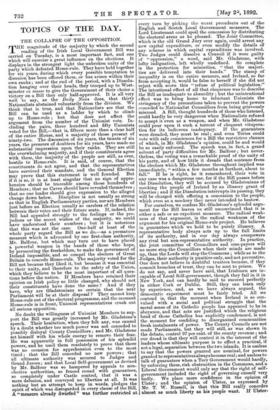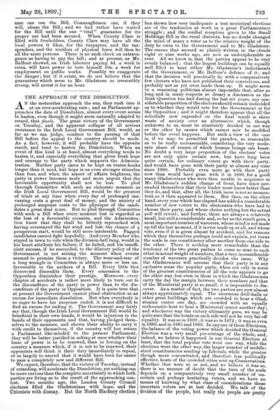TOPICS OF THE DAY.
THE COLLAPSE OF THE OPPOSITION. THE magnitude of the majority by which the second reading of the Irish Local Government Bill was carried on Tuesday, is a most important fact, and one which will exercise a great influence on the elections. It displays in the strongest light the unbroken unity of the party which defeated Home-rule. They have held together for six years, during which every possible temptation to disunion has been offered them, or has arisen within their own ranks ; and at the end of the period, with a Dissolu- tion hanging over their heads, they trooped up to West- minster en masse to give the Government of their choice a victory on a Bill they only half-approved. It is all very well to say, as the Daily News does, that thirty Nationalists abstained voluntarily from the division. We think that is true, and that Nationalists see that the Bill can be used as a ladder by which to climb up to Home-rule ; but that does not affect the argument from the number of the Unionist vote. In- chiding the pairs, three hundred and fifty Unionists voted for the Bill,—that is, fifteen more than a clear, half of the entire House, and a majority of those present of ninety-two. The discussion of six years, the taunts of six years, the pressure of doubters for six years, have made no substantial impression upon their ranks. They are still the overwhelming majority, and if their constituents agree with them, the majority of the people are still, as ever, hostile to Home-rule. It is said, of course, that the constituents do not agree, and that the representeives have survived their mandate, and the General Election may prove that this statement is well founded. But if it is so, it is at least singular that no sign of appre- hension should be traceable among those hundreds of Members ; that no Caves should have revealed themselves ; that no one leader should give expression to the alleged change down below. Discipline is not usually so strong as that in English Parliamentary parties, nor are Members just before an Election usually so careless of the relation between their votes and their future seats. If, indeed, the Bill had appealed strongly to the feelings or the pre- judices or the secret wishes of the majority, we could have understood their numbers ; but it is notorious that this was not the case. One-half at least of the whole party regard the Bill as we do,—as a premature measure which is advocated by one first-class authority, Mr. Balfour, but which may turn out to have placed a powerful weapon in the hands of those who hope, by persecuting the freeholders, to make the government of Ireland impossible, and so compel the electors of Great Britain to concede Home-rule. The majority voted for the Bill not because they liked it, but because it was essential to their unity, and therefore to the safety of the Union, which they believe to be the most important of all ques- tions before the nation. If Members have retained their opinion on Irish policy so little changed, why should not their constituents have done the same ? And if they have, why are Gladstonians so certain that the next Parliament will be at their disposal ? They cannot keep Home-rule out of the electoral programme, and the moment Home-rule is in front, Unionist representatives crush out all serious opposition.
No doubt the willingness of Unionist Members to sup- port the Bill was greatly increased by Mr. Gladstone's speech. Their hesitation, when they felt any, was caused by a doubt whether too much power was not conceded to possibly disloyal County Councillors ; and Mr. Gladstone set himself with his whole energy to remove their fear. He was apparently in full possession of his splendid powers, and he used them resolutely to prove that there was no occasion for apprehension even to the most timid ; that the Bill conceded no new powers ; that all ultimate authority was secured to Judges and Grand Jurors ; and that Local Self-government as devised by Mr. Balfour was so hampered by appeals to non- elective authorities, so fenced round with guarantees, so completely under Castle control, that it was a mere delusion, and conveyed no liberties at all. It was nothing but an attempt to keep in words, pledges the spirit of which was disregarded in every clause of the Bill. A "measure already dwarfed" was further restricted at every turn by picking the worst precedents out of the English and Scotch Local Government measures. The Lord Lieutenant could spoil the concession by distributing the electoral areas as he pleased. The Joint Committee, which is the old Grand Jury over again, could arrest any new capital expenditure, or even modify the details of any scheme in which capital expenditure was involved. Two Judges could dissolve a Council if it were guilty of "oppression," a word, said Mr. Gladstone, with lofty indignation, left wholly undefined. So complete is the protection for minorities, "that the majori- ties are delivered into their hands." The stamp of inequality is on the entire measure, and Ireland, so far from accepting it, would be false to herself if she did not reject with scorn this "refuse of political legislation." The intentional effect of all that eloquence was to describe the Bill as inadequate to absurdity ; but the unintentional effect was to bring home to reluctant Unionists the stringency of the precautions taken to prevent the powers conceded to Nationalist Councillors from being grievously misused. A Bill, thought hundreds of those who listened, could hardly be very dangerous when Nationalists refused to accept it even as a weapon, and when Mr. Gladstone could pour upon it such a torrent of eloquent vitupera- tion for its ludicrous inadequacy. If the guarantees were dreaded, they must be real ; and even Tories could vote with safe consciences for a Bill the restrictive clauses of which, in Mr. Gladstone's opinion, could be and would be so easily enforced. The speech was, in fact, a grand solvent of party difficulties for Mr. Balfour ; but never- theless, the voting was a remarkable proof of the unity of his party, and of how little it dreads that sentence from the electors which Mr. Gladstone throughout implied was immediately, "within a few months at furthest, about to fall." If he is right, be it remembered, their vote in any case was a dangerous one, for if the Bill passes before the Dissolution, they will be accused by Gladstonians of mocking the people of Ireland by an illusory grant of liberties ; and if the Dissolution interrupts its passing, they will be charged with offering a concession to the people, which even as a mockery they never intended to bestow. For ourselves, we confess Mr. Gladstone's splendid argu- ment for the Bill leaves us still unconvinced that it is either a safe or an expedient measure. The radical weak- ness of that argument, is the radical weakness of the argument for his original Home-rule project. He believes in guarantees which we hold to be purely illusory. A. representative body always acts up to the full limits of its authority, and in our day always overpowers any rival but non-representative authority. In practice, the joint committee of Councillors and cess-payers will no more stop the Councillors when their minds are made up, than the Lords will stop the Commons ; while as to the Judges, their authority is punitive only, and not preventive. One does not believe in doubtful trustees because, if they commit breaches of trust, they can be sent to prison. We do not say, and never have said, that Irishmen are in- capable of Local Self-government, though they fail in it in New York, and can hardly be said to succeed perfectly in either Cork or Dublin. Still, they can learn only by experience, and, as we have always argued, the democratic experiment must be fairly tried. All we contend is, that the moment when Ireland is so con- vulsed with a social and political struggle that the moral sense of its Catholic people has appeared to be in abeyance, and that acts are justified which the religious head of those Catholics has explicitly condemned, is not the moment for confiding to disorganised communities fresh instalments of power. The County Councils are not made Parliaments, but they will still, as was shown in the debate, control 97 per cent. of the county revenue ; and our dread is that they will control it in the interest of the leaders whose ultimate purpose is to effect a practical, if not a legal, separation between the two islands. It is useless to say that the powers granted are nominal, for powers granted to representatives always become real; and useless to talk of guarantees when a Tory Government would hardly, by enforcing them, risk obstruction in the Commons, and a Liberal Government would only say that the right of self- government included the right of governing oneself very badly. We place more confidence in the opinion of Ulster ; and the opinion of Ulster, as expressed by Mr. T. W. Russell, is that this Bill really concedes almost as much liberty as his people want. If Ulster- men can use the Bill, Connaughtmen can, if they will, abuse the Bill ; and we had rather have waited for the Bill until the one "vita.!" guarantee for its proper use had been secured. When County Clare is filled with freeholders, County Clare may have all the local powers it likes, for the taxpayers, and the tax- spenders, and the wielders of physical force will then be all the same persons. There is no such check on extrava- gance as having to pay the bill ; and at present, as Mr. Balfour showed, an Irish labourer paying 4d. a week in rates, will have power to vote himself 10s. a week for employment on public works. Possibly we exaggerate the danger ; but if it exists, we do not believe that the guarantees which seem to Mr. Gladstone so irresistibly strong, will arrest it for an hour.







































 Previous page
Previous page